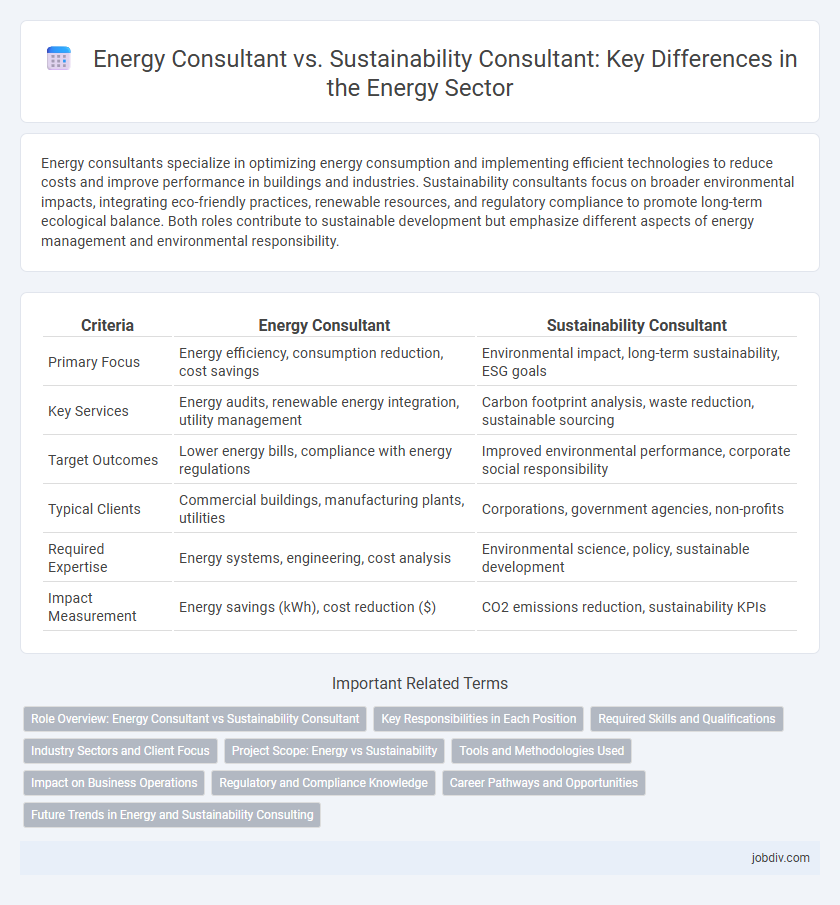Energy consultants specialize in optimizing energy consumption and implementing efficient technologies to reduce costs and improve performance in buildings and industries. Sustainability consultants focus on broader environmental impacts, integrating eco-friendly practices, renewable resources, and regulatory compliance to promote long-term ecological balance. Both roles contribute to sustainable development but emphasize different aspects of energy management and environmental responsibility.
Table of Comparison
| Criteria | Energy Consultant | Sustainability Consultant |
|---|---|---|
| Primary Focus | Energy efficiency, consumption reduction, cost savings | Environmental impact, long-term sustainability, ESG goals |
| Key Services | Energy audits, renewable energy integration, utility management | Carbon footprint analysis, waste reduction, sustainable sourcing |
| Target Outcomes | Lower energy bills, compliance with energy regulations | Improved environmental performance, corporate social responsibility |
| Typical Clients | Commercial buildings, manufacturing plants, utilities | Corporations, government agencies, non-profits |
| Required Expertise | Energy systems, engineering, cost analysis | Environmental science, policy, sustainable development |
| Impact Measurement | Energy savings (kWh), cost reduction ($) | CO2 emissions reduction, sustainability KPIs |
Role Overview: Energy Consultant vs Sustainability Consultant
Energy consultants specialize in analyzing and optimizing energy consumption to reduce costs and improve efficiency, focusing primarily on technical assessments and implementation of energy-saving solutions. Sustainability consultants take a broader approach by integrating environmental, social, and economic factors to develop comprehensive strategies aimed at achieving long-term sustainability goals. While energy consultants concentrate on operational energy impacts, sustainability consultants assess organizational practices to promote holistic sustainable development.
Key Responsibilities in Each Position
Energy Consultants specialize in analyzing energy consumption patterns, recommending efficiency improvements, and managing energy procurement to reduce costs and environmental impact. Sustainability Consultants focus on developing comprehensive sustainability strategies, ensuring compliance with environmental regulations, and promoting corporate social responsibility initiatives. Both roles require expertise in regulatory frameworks, but Energy Consultants emphasize technical energy solutions while Sustainability Consultants prioritize long-term ecological and social outcomes.
Required Skills and Qualifications
Energy Consultants require expertise in energy management, renewable energy technologies, and proficiency in energy auditing tools, alongside qualifications in engineering or environmental science. Sustainability Consultants need strong skills in environmental impact assessment, corporate sustainability strategy, and knowledge of regulatory compliance, typically holding degrees in sustainability, environmental policy, or related fields. Both roles benefit from analytical thinking, project management skills, and familiarity with industry standards such as ISO 50001 for energy and GRI for sustainability reporting.
Industry Sectors and Client Focus
Energy consultants typically specialize in industrial sectors such as manufacturing, utilities, and construction, providing expertise on energy consumption, efficiency improvements, and cost reduction strategies. Sustainability consultants focus on broader client needs across industry sectors including corporate, public, and nonprofit organizations, aiming to integrate environmental, social, and governance (ESG) practices for long-term sustainable growth. Both roles drive value by aligning technical solutions with client-specific goals, but energy consultants prioritize operational energy optimization while sustainability consultants emphasize holistic environmental impact and regulatory compliance.
Project Scope: Energy vs Sustainability
Energy consultants focus on optimizing energy consumption, improving efficiency, and reducing operational costs within specific projects, such as HVAC systems, lighting, or renewable energy installations. Sustainability consultants adopt a broader scope encompassing environmental impact assessment, resource management, and social responsibility alongside energy considerations. Project scopes in energy consulting are typically technical and cost-driven, while sustainability consulting integrates ecological, economic, and social dimensions for holistic long-term benefits.
Tools and Methodologies Used
Energy consultants utilize advanced energy modeling software such as RETScreen and EnergyPlus to analyze building performance and optimize energy consumption. Sustainability consultants employ lifecycle assessment (LCA) tools like SimaPro and GaBi to evaluate environmental impacts across product lifecycles and implement comprehensive sustainability strategies. Both professionals leverage data analytics and carbon footprint calculators to support informed decision-making and regulatory compliance.
Impact on Business Operations
Energy Consultants specialize in optimizing energy usage to reduce costs and enhance efficiency within business operations. Sustainability Consultants focus on integrating eco-friendly practices that minimize environmental impact while supporting long-term corporate social responsibility goals. Both roles drive operational improvements, but Energy Consultants prioritize cost savings through energy management, whereas Sustainability Consultants align business strategies with broader environmental and social objectives.
Regulatory and Compliance Knowledge
Energy consultants specialize in regulatory frameworks related to energy efficiency, utility incentives, and grid compliance to optimize operational costs and energy consumption. Sustainability consultants focus on broader compliance issues including environmental regulations, carbon credits, and ESG (Environmental, Social, and Governance) reporting standards to meet corporate social responsibility goals. Both roles require deep knowledge of local, national, and international laws but differ in scope with energy consultants targeting energy-specific mandates while sustainability consultants address holistic regulatory compliance.
Career Pathways and Opportunities
Energy consultants specialize in optimizing energy use and reducing costs through technical analysis and energy-efficient solutions, leading to career opportunities in utility companies, energy audit firms, and engineering consultancies. Sustainability consultants focus on integrating environmental, social, and governance (ESG) criteria into business strategies, offering pathways in corporate sustainability departments, environmental NGOs, and policy advisory roles. Both careers benefit from strong analytical skills and knowledge of regulatory frameworks, but sustainability consultants often have broader interdisciplinary roles encompassing social impact and long-term environmental planning.
Future Trends in Energy and Sustainability Consulting
Energy consultants specialize in optimizing energy efficiency and managing energy costs, focusing on technologies such as smart grids and renewable energy integration. Sustainability consultants concentrate on broader environmental impacts, including carbon footprint reduction, circular economy practices, and regulatory compliance in sustainability standards. Future trends highlight a convergence of these roles, driven by advancements in AI-driven energy management systems and increasing demand for holistic ESG (Environmental, Social, and Governance) strategies.
Energy Consultant vs Sustainability Consultant Infographic

 jobdiv.com
jobdiv.com